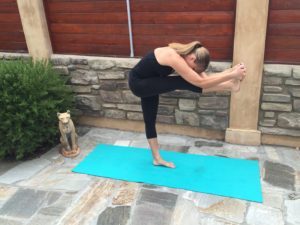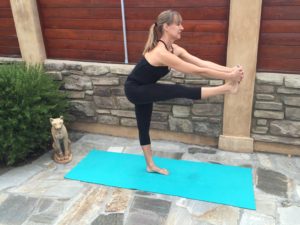 Without doubt, one of the most transformative experiences I have had are the physical and emotional changes from regularly engaging with Bikram Yoga.
Without doubt, one of the most transformative experiences I have had are the physical and emotional changes from regularly engaging with Bikram Yoga.
I went to my first class 8 years ago (when already in my 40’s) with a body that was in okay shape, but not very flexible. Fast forward to today and the benefits of going to classes around four times per week for 8 years have paid off.
Not only is my body in better condition through regular stretching and detoxing in a hot yoga room, but my emotional self has vastly benefited. Without doubt, I’m a much better coach (and person) as a result. I can go to a class feeling irritated and I’m guaranteed that after a 90 minute class, I will be feeling centered with new perspectives available to me. Truly amazing!
There are so many great lessons I’ve learned from this regular practice, so I thought I’d share some of them with you and how I apply them to mentor coaching.
Meet the student where they are
With Bikram Yoga, you go through the same 26 postures each time, over 90 minutes. I am amazed that I can find enthusiasm for going time after time when I’ve already been to over 1000 classes doing the same 26 postures!
Yet each day I go, my body and mind are a little different. The teacher, and the temperature in the room may be different. By focusing on doing each posture to my best current ability, I find enjoyment in the process (even if I feel really challenged on a given day) and cumulative improvement over time.
If I think about how far I am away from doing each posture ‘perfectly,’ I would be very frustrated and would probably have given up.
 This part of one posture (standing head to knee) took me nearly 6 years to get my top leg straight alone! I’m still working on it, as well as taking the posture toward full expression as shown in the first photo.
This part of one posture (standing head to knee) took me nearly 6 years to get my top leg straight alone! I’m still working on it, as well as taking the posture toward full expression as shown in the first photo.
I can only hold for a few seconds, and only on some days. It’s a constant curiosity to me how far my body will allow me to go on a given day.
Every day is an adventure as to how flexible I am and how straight that top leg goes, and for how long I can hold the position. I have to be in the moment, where I’m at today with my body, mind and the elements outside my control (teacher approach, room temperature…). If I don’t stay in the moment, I fall out of the posture very quickly.
How that translates as a lesson for being a mentor coach is that often our mentees want to be through the process and have their coaching skills meet an ICF credential level, be that MCC, PCC or ACC. When they first receive feedback on their current coaching skill level, it can be disappointing for them, as they want to do it perfectly from the beginning.
This can be especially challenging for senior coaches moving toward their MCC credential, who haven’t had a qualified person listen to their coaching in many years. The Ten Characteristics of MCC Skill Level are easy to understand, yet might take longer to integrate. Like anything we do in life, if we aren’t regularly putting attention on something, our skill level might decline.
Giving ourselves permission to be a learner at any skill level is a great mindset to have.
So meet the mentee where they are now, and help them calibrate their current skill level, then identify where they can make some changes. And to be patient, as lasting change takes time.
Stay present in the moment
Sometimes we want to be ahead of where we are. In Bikram, you are holding postures for between 10 seconds – 60 seconds each. Sometimes people want to wait a bit before getting into the posture, maybe so it’s not as long. Yet this mindset of not staying in the moment means that the benefit of group energy can be dissipated. When a student is behind, or ahead of the teacher, this can be an indication of not staying present in the moment.
We need to discern between having a lazy or weak mind where we give up on the pose because it’s challenging to hold. On the other hand we need to discern when to shorten the posture because we need to take care of an injury or inflexible area of the body.
I notice that longer practicing students (and teachers practicing) are often the worst culprits of getting behind or ahead of the teacher. This is poor role modeling by teachers in particular, and a reminder for us mentor coaches to be conscious of what we say and how we say it. Are we using a coach approach to mentoring?
The mind is often the weakest part of us, and needs the most strengthening. Staying present in the current moment for periods of time can be the most challenging thing of all!
How that translates as a lesson for being a mentor coach is when listening to a coaching recording, I’m listening for how in-the-moment they are with their client. If they are ahead of their client, the coach will be interrupting the client. If they are behind, they will say things that indicate they are still thinking about something the client said in the past, or are more connected to their own thoughts and beliefs (Who they are) than being in the moment and present to Who their client is.
Coaching Presence is a critical core competency, at the center of The Target Approach. When we are fully present, we have the ability to respond to what is occurring now, which is where the point of real power is. When we get frustrated because the learning is challenging us, we have an opportunity to become aware of this mindset and determine what we might want to do instead.
Some of my bottom-line learnings
To improve at anything means practicing regularly and engaging a Learner mindset. To gain enjoyment while learning, stay present in the moment and do the best you can.
With this attitude I find myself strengthening my happiness muscles. Being ahead even a few seconds of the teacher (or coaching client) can have an unintended impact on other people. Knowing where you are headed is very useful, yet being frustrated with not being ‘there’ yet is a waste of life energy.
As Marna, a Bikram Yoga teacher, said in today’s class, “Yoga wouldn’t be Yoga without a bit of fun.” This is true of coaching as well. A bit of lightness can help our client to relax, whether we are coaching, or mentoring. Maybe the saying could also be, “Life wouldn’t be life without a bit of fun!”
Are you preparing for your first or next ICF Credential?
Do you want to “Sharpen the Saw” as a Coaching Professional?
Our next Group/Individual Mentoring Program commences September, 2016 and carries 23.5 ICF Core Competency CCE units! (including 10 hours of mentor coaching)
Start your mentoring requirements or to obtain CCE units for credential renewal!
You can learn more here
Carly Anderson and Karen Boskemper offer an awesome mentor coaching group and individual program that has many exclusive offerings for our participants. Both have been trained by the ICF to assess using the new PCC Markers. Carly also assesses for the ICF MCC credential.
One of those offerings is an extensive library of MCC, PCC and ACC coaching sessions for our participants to listen to, evaluate, debrief, and learn from, along with The Target Approach to demystifying the ICF core competencies. These are incredibly valuable learning tools, and will accelerate your understanding of competency distinctions.
Here’s where you’ll find more about The Mentor Coaching Group

